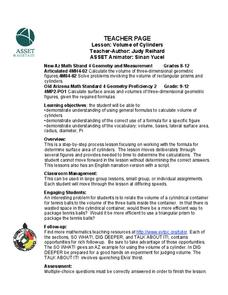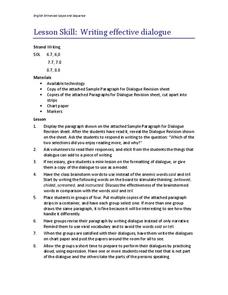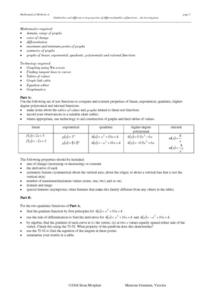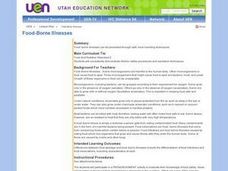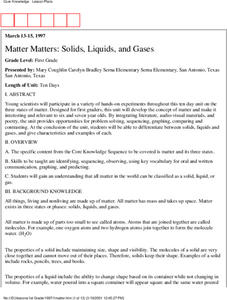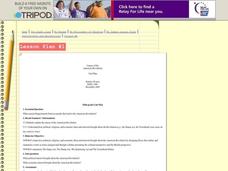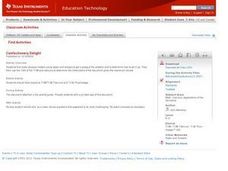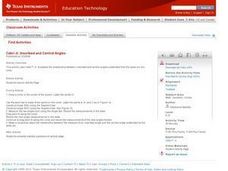Curated OER
Earthquakes and Volcanoes
Yay! It's a sentence fragment worksheet that focuses on a specific topic. Interest your learners with the topic of earthquakes and volcanoes. They read 18 examples and decide whether the example is a sentence or fragment.
Alabama Learning Exchange
Are You a Square or a Rectangle?
Discover the difference between standard and non-standard units of measure with your class. They differentiate between rectangles and squares, read a book, measure a peer's height. They then discuss measurement methods, make...
Curated OER
I Am Special and You Are Special Too #6
We are All Alike…We Are All Different is the springboard for the creation of an illustrated book in which young writers record their impression of themselves, their families, and their interests. Sharing the completed books in circle...
Futures Channel
Folding Circles
Students investigate properties of circles. In this geometry lesson, students differentiate between similarity and congruence as they observe polygons. They investigate properties of two and three dimensional shape.
Curated OER
Volume of Cylinders
Middle and high schoolers calculate the volume of cylinders. In this geometry lesson, learners differentiate between rectangular prisms and cylinders. They use the correct formula to solve for each solid.
Virginia Department of Education
Deciding the Mode
Are your young writers having difficulty distinguishing between expository and persuasive writing? Discuss the difference between the two, and how some prompts can be responded to in either fashion. Included here is a simple lesson plan...
Virginia Department of Education
Writing Effective Dialogue
Spend a productive hour in the classroom with this tutorial where junior high writers discover how to create snappy dialogue. The learning begins with an analysis of sample writing and discussion on the effectiveness of each piece. The...
Curated OER
Ford's Revolution (Differentiated by Ability)
Students explore the effects of Ford's use of the assembly line, auto financing, and increased wages to make his fortune. They complete a worksheet using the internet.
Curated OER
Similarities and Differences in Properties of Different Families of Functions - An Investigation
Exploring families of functions allows high schoolers compare and contrast properties of functions. Students discuss properties that include symmetry, max and min points, asymptotes, derivatives, etc.
Curated OER
Food-Borne Illnesses
Use this lesson to have your charges consider the differences between food spoilage and food-borne illnesses including the differentiation of food infections and food intoxication, including characteristics of each. Some excellent...
EngageNY
Developing Reading Fluency: Selecting a Text and Practicing Reading Aloud
Young readers continue to strengthen their fluency skills with a text of their choosing. The teacher first engages the class with an audio recording or read-aloud of a short poem, modeling for children how to read fluently. Next it's...
National History Day
“Saving the Bear”: The Russian Expeditionary Force of World War One
How have Russian politics affected countries on a global stage? The discussion of the Russian Revolution and World War I begins with an analysis of primary resource letters. Learners finish with a project where they create a timeline of...
Smithsonian Institution
Lexington and Concord: Historical Interpretation
Learners view and analyze three different images related to the Battle of Lexington and Concord. They also answer a variety of questions in a graphic organizer to help keep the information straight.
NASA
Einstein and His Times
Scholars research and present on the historical happenings of 1919. After sharing their findings, pupils debate about how Congress dealt with the moral issues of the time. The evaluation asks learners to write a persuasive...
Cave Creek Unified School District
Crusades and Culture in the Middle Ages
The Crusades sounds like a glamorous time period in the Middle Ages full of glory—but was it? Scholars find and review the truth of the Crusades' influence on the world through the resource. The study guides, separated individually by...
Curated OER
Darwin’s Bees
What do you call a bee born in May? A maybe! This first instructional activity in a series of four begins with a starter activity to get scholars thinking about the topic. Then a circus, or circuit of seven activities,...
Curated OER
Lions and Tigers and Bears - Oh My!
Research animals and develop a non-fiction presentation. Students will complete research on a particular animal and determine the animal's characteristics as well as habitat before choosing a differentiated project to present using the...
Curated OER
Matter Matters: Solids, Liquids and Gases
Scientists participate in a variety of hands-on experiments in this ten-day unit on the three states of matter. Lessons incorporate literature, a-v materials, and poetry to help students differentiate between solids, liquids and gases.
Curated OER
Causes of the American Revolution
Fifth graders investigate the causes of the American Revolution. They explore how political, religious, and economic ideas and interests brought about the Revolution (e.g., the Stamp Act, the Townshend Acts, taxes on tea, coercive Acts)....
Curated OER
Biodiversity and Ecosystems
Middle schoolers differentiate between biotic and abiotic factors in this science lesson. Learners collect data for the experiment and analyze the data after graphing it using the CBL 2. This experiment is split into two different...
Texas Instruments
Confectionery Delight
High schoolers explore the problem of maximizing the volume of a box by making a physical model and observing how changes in the orientation of the paper changes the volume. They use the symbolic capacity of their calculators and...
Texas Instruments
Cabri Jr. Inscribed and Central Angles
Learners will differentiate between inscribed and central angles in this geometry instructional activity. They answer questions dealing with circles as they relate to inscribed triangles and angles. This assignment includes a printable...
Curated OER
Periodicity (The Periodic Table)
High schoolers investigate the properties of elements and periodicity. In this periodicity lesson plan, students observe a bag of 'elements' which are different fruits and classify them in groups and periods, show the periodic...
Curated OER
Screaming for Ice Cream
Mathematicians investigate maximizing volume by learning to explore the problem in which they seek to maximize the volume of a cone. Students solve the problem symbolically, graphically, and through the use of integration or...






